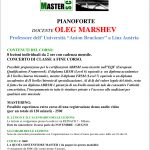International Record Review
PABST Piano Concerto in E fiat RIMSKY-KORSAKOV Piano Concerto in C sharp minor SCRIABIN Piano Concerto in F sharp minor
Oleg Marshev (piano); South Jutland SO/Vladimir Ziva Danacord DACOCD 660 73:52 mins. Producer Lennart Dehn. Engineer Stephan Flock
Listening to these captivating performances, with all concerned playing as though they believed in every note, reminded me of Vox’s 1970s heyday in the UK on Decca Turnabout when 99p would buy you Michel Ponti playing Balakirev, Lyapunov or Tchaikovsky’s Second with a scorching abandon and imperativeness that in many ways has never been surpassed on disc.
Oleg Marshev opens with Pabst’s wrist-crippling E flat Concerto, a majestic barnstormer that lays testimony to the sheer professionalism of many ‘lesser’ composers during the second hall’ of the nineteenth century. Although it is more cosmopolitan in tone than either the Rimsky-Korsakov or Scriabin concertos, there is not a single truly memorable tune along the way, yet Pabst’s piano writing is so all-engulfing that there is barely time to notice. Marshev plays with a sparkle and technical suavity that brings to mind Earl Wild’s celebrated account of the Scharwenka B flat minor Concerto, and although no one would confuse the South Jutland Symphony with the Boston Symphony in full cry, it plays with such devoted conviction that any passing intonational vagaries barely register in context.
Rimsky-Korsakov’s Concerto has never been one of his more popular works, yet played with this degree of exhilarating ?lan and sensitivity it sounds like a near-masterpiece. The Andante mosso `slow’ movement is lovingly shaped and the second movement Allegretto quasi polacca bustles along most infectiously. The Scriabin Concerto has, of course, been recorded with some distinction before – most notably by Heinrich Neuhaus for Melodiya – and although Marshev may strike you as lacking something in sheer charisma and incandescence, his bravura command and poetic shaping of phrases, particularly at low dynamic levels, provides more than adequate compensation.
The recording captures these fine performances with undistracting poise and Malcolm MacDonald’s booklet note is exemplary.
Julian Haylock


